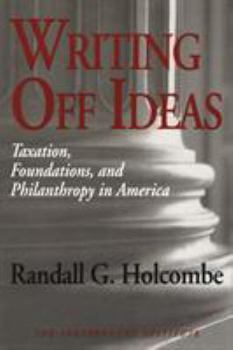Writing Off Ideas: Taxation, Foundations, and Philanthropy in America
Select Format
Select Condition 
Book Overview
Tax-exempt foundations grew substantially in the twentieth century, both in their financial importance and in the scope of their activities. This challenging book examines the economic, cultural, and... This description may be from another edition of this product.
Format:Paperback
Language:English
ISBN:0765806800
ISBN13:9780765806802
Release Date:June 2000
Publisher:Routledge
Length:296 Pages
Weight:0.55 lbs.
Dimensions:0.9" x 6.0" x 9.0"
Related Subjects
Accounting Accounting & Finance Business Business & Finance Business & Investing Economic Policy Economic Policy & Development Economics Industries & Professions Law Nonprofit Organizations & Charities Philanthropy & Charity Political Science Politics & Government Politics & Social Sciences Popular Economics Public Policy Social Science Social Sciences Tax LawCustomer Reviews
1 rating
Nice Examination of Moral Hazards Faced by Foundations
Published by Thriftbooks.com User , 23 years ago
"Writing Off Ideas" is Randall Holcombe's examination of the role charitable foundations play in shaping public policy in a free society. In it, he explores issues like donor intent and whether institutional incentives exist to ensure that foundation board members are held accountable for their actions.He begins by pointing out that the vast majority of charitable foundations in the twentieth century were established under very general mandates to promote the public interest. He claims this approach enables board members to address unique problems in society as they occur and prevents their current leadership from being constrained by the desires of their original donors. As foundations are funded entirely by earnings from initial bequests, he believes their board members are essentially free from external oversight and accountable to no one. Thus, he implies that the merits of many programs supported by foundations can be called into question.In addition, he states that the tax code exacerbates this problem by encouraging wealthy individuals to make large bequests to foundations to avoid inheritance tax penalties. As a result, he claims far more foundations exist under the current tax code than would be necessary under a neutral code.To illustrate the moral hazard inherent in this arrangement, he provides a revealing quote from former MacArthur trustee Rod MacArthur: "Foundations should be striving to do the kinds of things that the government cannot do. I repeat, cannot do: things that are not politically popular, things that are too risky, things that are just too far ahead to what the public will put up with..."Predictably, Holcombe uses the legendary exploits of the Ford Foundation during the 1960s as examples of how some boards run amok. However, his criticisms are not restricted to the Left. Surprisingly, he attacks the Manhattan Institute for using foundation money to underwrite the efforts of Charles Murray in "Losing Ground." Although he does not question Murray's conclusions about the proper role of government in domestic welfare policy, he does criticize Murray for claiming that the availability of foundation funding was a motivating factor in his decision to write the book.In criticizing Murray, he runs the risk of sounding like Elizabeth Drew and other advocates of campaign-finance reform. He walks a very fine line between claiming that individuals who receive tax-deductible funds to promote their views should be subjected to greater scrutiny than those who do not, and claiming that funding used to promote political views should only be distributed via democratic decree. However, as with other forms of political speech, he asserts that members of the public are already well aware of the bias inherent in foundation funding and stops well short of advocating limitations on foundation-sponsored research.Despite these problems, he asserts that the public expects three things from foundation managers: that they do not use their assets fo





